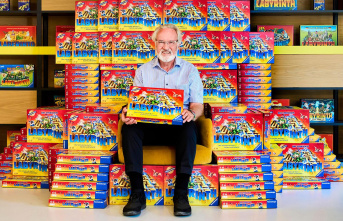The title of the new album by producer guru Daniel Lanois says it all: "Player, Piano" - a man plays on and with the piano. The musician, born in Quebec/Canada in 1951, has said goodbye as far as possible to his multi-award-winning studio jobs for rock greats such as U2, Peter Gabriel, Bob Dylan and Neil Young (to name just the most well-known) - and the path to inwardness searched.
After Lanois had - similarly surprisingly - released a successful gospel album ("Heavy Sun") last year, he now immerses himself over 13 tracks in soothing piano melodies with some organ and a few keyboard gimmicks, touching on neoclassic and ambient music . Even if titles like "Parade", "Clinch" or "Wild Child" make you expect something different, it never goes beyond melancholic ballad flair or impressionistic dabs of piano.
This may be boring for fans of the ingenious pop and rock producer Lanois - for unbiased and stylistically open listeners, on the other hand, it is an acoustic blessing in times of crisis. The 71-year-old Canadian says about his delicate miniature "Eau": "At its core, the piece has something of a lullaby and an anthem."
Strings dampened with cloth
The recordings were "one big journey" for him, according to Lanois, whose solo debut "Acadie" was a good 30 years ago. "And that at a time when I actually had to keep my feet still and was stuck. (...) I had encounters with the spirits of people like Erik Satie, Oscar Peterson and Harold Budd."
For a special sound, the multiple Grammy winner prepared three pianos in the studio together with co-producer Dangerous Wayne Lorenz. For example, the musicians used tea towels to dampen the strings and attached pieces of felt to the heads, which softened the attack.
"I said to myself: If I'm going to make a piano record, then it has to sound like recordings from the forties or fifties - because back then the piano still had this very soft and beautiful sound," explains Lanois. He succeeded in the experiment - "Player, Piano" is of a gently lulling, flawless intimacy.
Website of Daniel Lanois












